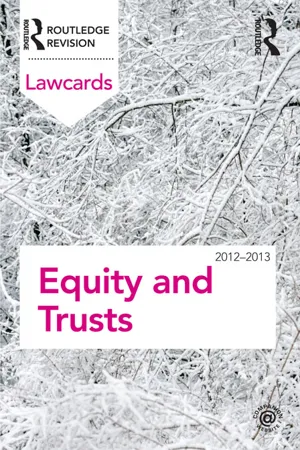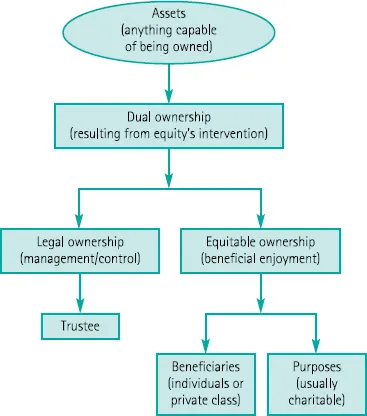
- 264 pages
- English
- ePUB (mobile friendly)
- Available on iOS & Android
Equity and Trusts Lawcards 2012-2013
About this book
Routledge Lawcards are your complete, pocket-sized guides to key examinable areas of the undergraduate law curriculum and the CPE/GDL. Their concise text, user-friendly layout and compact format make them an ideal revision aid. Helping you to identify, understand and commit to memory the salient points of each area of the law, shouldn't you make Routledge Lawcards your essential revision companions?
Fully updated and revised with all the most important recent legal developments, Routledge Lawcards are packed with features:
-
- Revision checklists help you to consolidate the key issues within each topic
- Colour coded highlighting really makes cases and legislation stand out
- Full tables of cases and legislation make for easy reference
- Boxed case notes pick out the cases that are most likely to come up in exams
- Diagrams and flowcharts clarify and condense complex and important topics
'...an excellent starting point for any enthusiastic reviser. The books are concise and get right down to the nitty-gritty of each topic.' - Lex Magazine
Routledge Lawcards are supported by a Companion Website offering:
- Flashcard glossaries allowing you to test your understanding of key terms and definitions
- Multiple Choice Questions to test and consolidate your revision of each chapter
- Advice and tips to help you better plan your revision and prepare for your exams
Titles in the Series: Commercial Law; Company Law; Constitutional Law; Contract Law; Criminal Law; Employment Law; English Legal System; European Union Law; Evidence; Equity and Trusts; Family Law; Human Rights; Intellectual Property Law; Jurisprudence; Land Law; Tort Law
Tools to learn more effectively

Saving Books

Keyword Search

Annotating Text

Listen to it instead

Equity and the nature
and types of trust
What is meant by the term ‘Equity’? |  |
Why did Equity develop as a system of law separate to the Common Law? |  |
Were the systems of Common Law and Equity fused by the Judicature Acts? |  |
What is understood by the term ‘Trust’? |  |
Distinguish between an express trust, resulting trust and constructive trust |  |
What is a discretionary trust? |  |
| What is a protective trust? |  |
Distinguish between a bare power and a trust |  |
Identify six maxims of Equity |  |
THE ANATOMY OF A TRUST

KEY ELEMENTS OF THE TRUST
ASSETS
EQUITABLE ORIGIN OF THE TRUST
THE MAXIMS OF EQUITY
Delay defeats equities
Equity is equality
Equity acts in personam
Equity looks to the intent rather than the form
Equity will not allow a statute to be used as an instrument of fraud
Equity will not allow a trust to fail for want of a trustee
Equity will not assist a volunteer
Equity will not perfect an imperfect gift
He who comes to equity must come with clean hands
Table of contents
- Front Cover
- Title Page
- Copyright
- Contents
- Table of Cases
- Table of Statutes
- How to use this book
- 1 Equity and the nature and types of trust
- 2 Capacity and the three certainties
- 3 Statutory formalities
- 4 Constitution of a trust
- 5 Resulting trusts
- 6 Constructive trusts
- 7 Trusts of the family home
- 8 Charitable trusts
- 9 Non-charitable purpose trusts, trusts of imperfect obligation and unincorporated associations
- 10 Trustees and administration of the trusts
- 11 Breach of trust and remedies
- 12 Equitable remedies of injunction and specific performance
- 13 Putting it into practice . . .
Frequently asked questions
- Essential is ideal for learners and professionals who enjoy exploring a wide range of subjects. Access the Essential Library with 800,000+ trusted titles and best-sellers across business, personal growth, and the humanities. Includes unlimited reading time and Standard Read Aloud voice.
- Complete: Perfect for advanced learners and researchers needing full, unrestricted access. Unlock 1.4M+ books across hundreds of subjects, including academic and specialized titles. The Complete Plan also includes advanced features like Premium Read Aloud and Research Assistant.
Please note we cannot support devices running on iOS 13 and Android 7 or earlier. Learn more about using the app